

7 Addictive Korean TV Shows You Don’t Want to Miss
Who doesn’t love watching TV?
It’s a universal way to wind down and relax at the end of the day—but often it smacks of “guilty” pleasure. There is always something else we could be doing… reviewing Korean conjugations, perhaps?
Well, what if it were possible to remove the guilt factor and bring a little fun into our language study?
Enter, Korean television.
South Korea has a booming television industry. There are programs to suit any taste, and once you learn a few techniques for how to watch and study, watching TV can be a great aid to your Korean language learning.
However, you won’t learn much by simply kicking back and zoning out in front of the screen. It’s going to take a little more active engagement than that. So how can watching TV help to improve your Korean? Well, I’m glad you asked!
Download: This blog post is available as a convenient and portable PDF that you can take anywhere. Click here to get a copy. (Download)

Why Watch TV to Learn Korean?
Let’s start with the most obvious reason:
- It’s fun! You’re naturally more engaged when doing activities that you enjoy, so you should find that you can concentrate longer when watching an interesting show. Personally, I have never been able to practice flashcards for more than half an hour in one go, but I’ve been known to spend an entire day watching Korean TV!
- It immerses you in the language. Nothing leads to success in language study like immersion. To hear the language spoken around you, and to be able to use it in your daily life accelerates your learning significantly. This fascinating study showed that even after months of no exposure, participants who learned a language implicitly (through immersion) still had surprisingly high rates of language retention—because they had learned to think like native speakers. My favorite way to immerse myself in Korean is by watching television.
- It’s varied in topic and level. Watching TV is also helpful as a study aid because it’s so easy to keep your study varied enough to be interesting. You can watch different genres to suit your taste or mood, so you’ll never get bored. You can also change the difficulty level very easily, again, simply by changing what you watch. Absolute beginners can watch more passively with subtitles just to get used to the sound of the language, and engagement can build from there.
- It’s full of language lessons. The language itself can be extremely different between genres of shows. For example, variety shows tend to use simple, conversational language, while dramas can cover a wide range of topics with varying formality and tone (influenced by the characters and their situations). Documentary and news shows will be more formal, and the vocab quite thematically specific.
How to Actively Watch Korean TV to Maximize Learning
There are many different suggestions of how to study language while watching TV. What you choose can depend on your preferred learning style, but definitely go beyond just “watching”! Explore and try out some new active learning techniques each time you watch. Here are some ideas to get you started:
- Take notes. Some learners love note-taking—writing down vocab or grammar patterns that they don’t recognize while they watch, to review later. Variety shows in particular are great for this (for beginners especially), as they are often plastered with Korean subtitles which you can just copy down.
- Repeat aloud. You can practice pronunciation really well by mimicking what you hear on TV. Just be aware of how honorifics and social context affect how the characters are speaking.
- Use subtitles. I’m a big fan of using subtitles to my advantage while watching Korean TV shows. Watching something with and without subtitles changes the difficulty considerably.
If you’re still at an early level, you can put on English subtitles the first time you watch something in Korean. Sit back and enjoy it to understand the plot. The next day, watch that episode again—this time concentrating on the words and grammar. Press pause and take notes often, repeating the episode many times until you know the story and phrases really well.
Then watch it with Korean subtitles (or begin with Korean subtitles from the start if you’re at an intermediate level). This makes the note-taking suggestion far easier, because you can check your spelling and use the subtitles to navigate your way through the more complicated sentences. Pull the episode apart scene by scene, press pause often, and dig out language lessons. You might spend a full week or more on a single episode.
Finally, you’re ready to watch the episode without subtitles. It could feel a bit overwhelming at first, especially for beginners. But if you’ve spent enough time rewatching the episode with subtitles and taking it apart, you’ll probably understand most of it. As your ability to concentrate on what you hear improves, you will find that you need to watch with subtitles less and less.
- Create associations. Another reason to watch your favorite episodes over and over again is that you can create image associations between what happens on the screen and what is said, to trigger the phrase in your memory. Comedy is really useful for this, as many comedians who appear on variety shows tend to have catchphrases, or inside jokes than run throughout a series. You can also develop a kind of “relationship” with characters throughout a series, as you begin to understand their particular situation and how it affects their language.
1.“Descendants of the Sun”

“Descendants of the Sun” has absolutely swept the K-drama floor this year. A hit throughout Asia and beyond, the series tells of the love story between Yoo Si-jin (Song Joong-ki), a solider in the Special Forces, and Dr. Kang Mo-yeon (Song Hye-kyo) who are both assigned to work in the fictional country of Urk in Northern Africa.
It’s a desperately romantic, shockingly addictive series. With vocab ranging from witty, flirtatious banter to stiffly formal and thematically-significant military- and medical-speak, there is plenty of meat for a learner of Korean to bite into.
You can watch it online with subtitles at Viki.
2. “Roommate”

This is the show that really got me into Korean TV. “Roommate” had a simple premise: a beautiful house in Seoul, filled with Korean celebrities who live together.
It’s a completely different experience for those of us who are used to the American version of reality TV, where characters have catfights, steal each others boyfriends and drink themselves into oblivion.
The characters on “Roommate” have hula-hooping competitions to determine who will have to clean the house. They wait up for each other to come home from their crazy work schedules, and make each other late-night meals. Everybody seems to genuinely enjoy each other’s company, and the absence of obviously scripted conversations and conflicts makes the action and dialogue appear wonderfully natural.
“Roommate” is great for getting an idea of the style of casual, friendly Korean, and is a great show for beginner learners.
You can watch it on with English subtitles on iflix, but it is limited to certain geographical regions.
3. “Unpretty Rapstar”
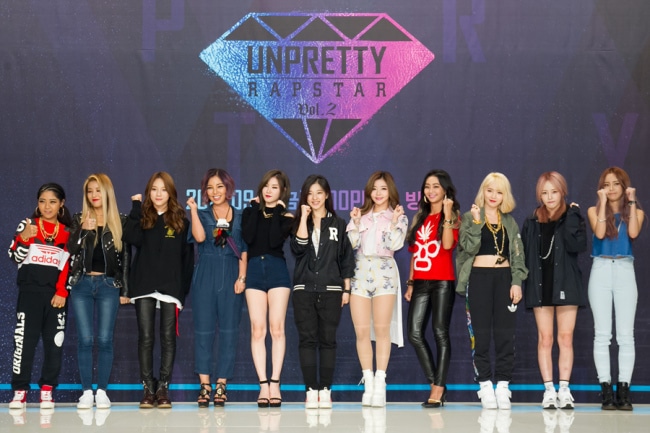
“Unpretty Rapstar” is a music competition reality show with a focus on female rappers. Unlike music competition shows in the West, which discover and promote unknown artists, contestants on “Rapstar” are already known celebrities—usually the rappers from various K-pop groups.
Contestants are introduced through a “cypher,” where each contestant improvises a self-introduction over the same beat. Episodes are then arranged as “missions,” where each contestant must write and arrange an original rap song, and direct a music video or live stage performance of the song. Contestants then vote for their peers to choose each week’s winner. The winner receives some kind of advantage for the next week’s mission. There is also a “diss battle,” in which contestants battle one-on-one in a closed event with no MC.
This is a great show for K-pop fans to get to see the basics of how songs are made, and more advanced learners may even learn a thing or two about writing lyrics or dissing in Korean!
You can check out highlights with English subtitles on the show’s YouTube channel.
4. “Now on My Way to Meet You”
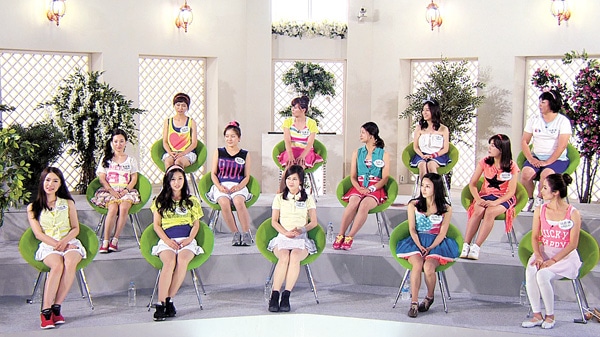
This one is a truly unique show: A panel of female North Korean defectors (called “beauties”) show off talents, shed tears and tell stories of their lives and escape. Heartbreaking stories of hardship contrast with comedy sketches and flirtations with a panel of male South Korean comedians. The show was highly popular, and singular in its attempt to soften attitudes in South Korea about defectors from the North.
This is a fascinating show for those of us with an interest in social and political culture, delivered in a highly entertaining way. Listen carefully and you can notice differences in the language used by some of the North Korean “beauties.”
Episodes can be harder to find, but clips are available on YouTube.
5. “Boys over Flowers”
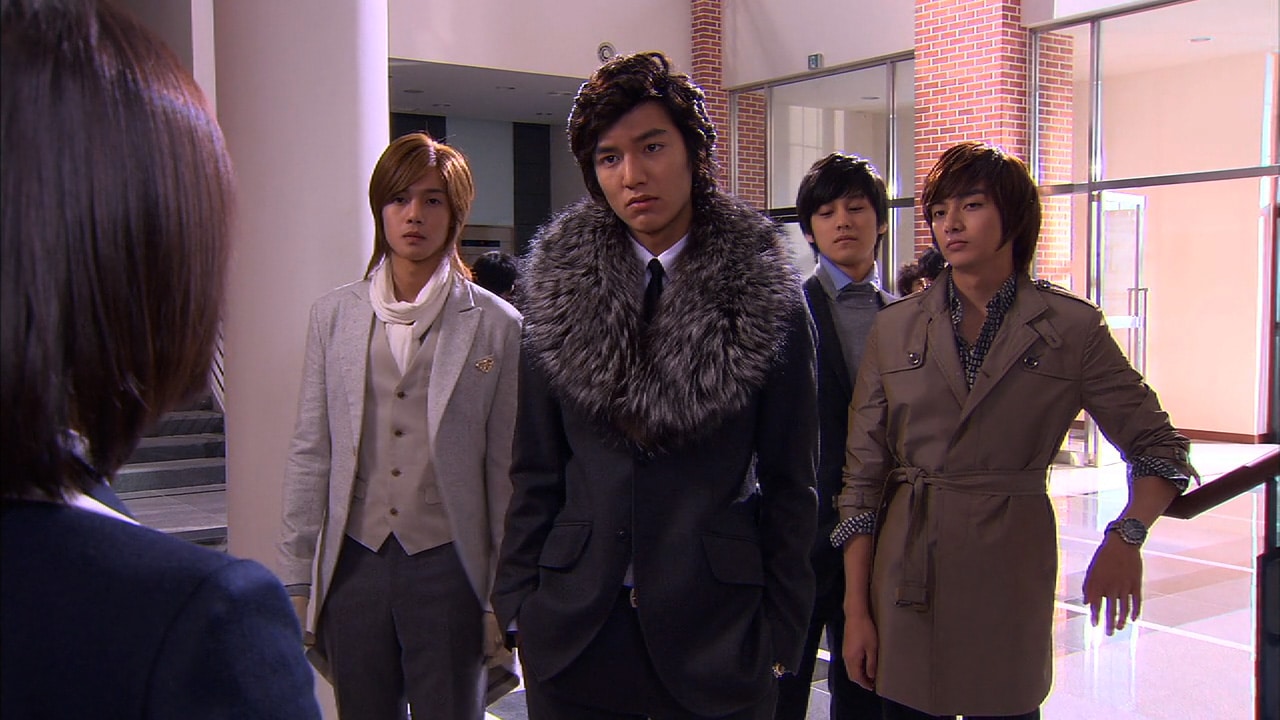
This is the show that really can be credited with starting the Korean Wave outside of Asia. An adaptation of the Japanese manga “Hana Yori Dango,” “Boys Over Flowers” tells the story of Geum Jan Di (Ku Hye-sun), a poor girl who finds herself attending Korea’s most exclusive college.
This school is ruled by the iron fist of F4, the school’s four wealthiest and most handsome boys. Geum Jan Di’s uncrushable spunk melts the heart of F4’s arrogant leader Gu Jun Pyo (Lee Min Ho), allowing him to atone for his years of bullying.
Being a schoolyard drama, “Boys over Flowers” is a great source of classroom-related vocab, and more advanced students of Korean should find the difference between Geum Jan Di and F4’s class-evident manner of speaking quite interesting.
You can binge it with subtitles on Viki.
6. KBS World’s “News Plaza”

KBS Worldis a South Korean TV channel operated by Korean Broadcasting System (KBS). Targeted at audiences abroad, it’s primarily broadcast in Korean with English subtitles showing news, including entertainment news.
“News Plaza,” one of four new programs on KBS World, has a runtime of 30 minutes per episode and delivers domestic Korean and international news nightly from Monday to Friday. Episodes are broken up into a combination of headlines, in-depth commentary, entertainment news and lifestyle information.
Watching the news in another language comes with its own array of benefits and study strategies. Listen to the way newsreaders use honorific and formal language on their site and YouTube channel, and practice your reading by following KBS World on Twitter.
7. “Running Man”

Currently one of the longest-running and most popular variety shows in Korean TV history, and one of the most well-known variety shows in the Hallyu community worldwide, “Running Man” is a Korean variety show you don’t want to miss.
Originally, “Running Man” contestants performed various tasks at famous Korean landmarks to win a race. The cast is made up of regular contestants and guests, many of whom participate recurrently. Over time the style of the show has adapted to a more standard reality-variety show, where contestants complete one long race by playing continuous games. Some episodes now take place around the world.
All the action, fairly minimal dialogue and subtitles make “Running Man” a great variety show for beginner Korean learners and people unaccustomed to Korean TV.
You can watch it with English subtitles on Viki.
Language learning must be one of the few endeavors that allow us to call watching TV “study.” So sit back, relax and immerse yourself in some Korean TV shows!
Download: This blog post is available as a convenient and portable PDF that you can take anywhere. Click here to get a copy. (Download)
And One More Thing...
If you enjoyed this post, you're already halfway to having the time of your life learning Korean with FluentU!
FluentU makes it possible to learn with K-pop videos, funny commercials, entertaining web series and more. Just a quick look will give you an idea of the variety of FluentU videos on offer:
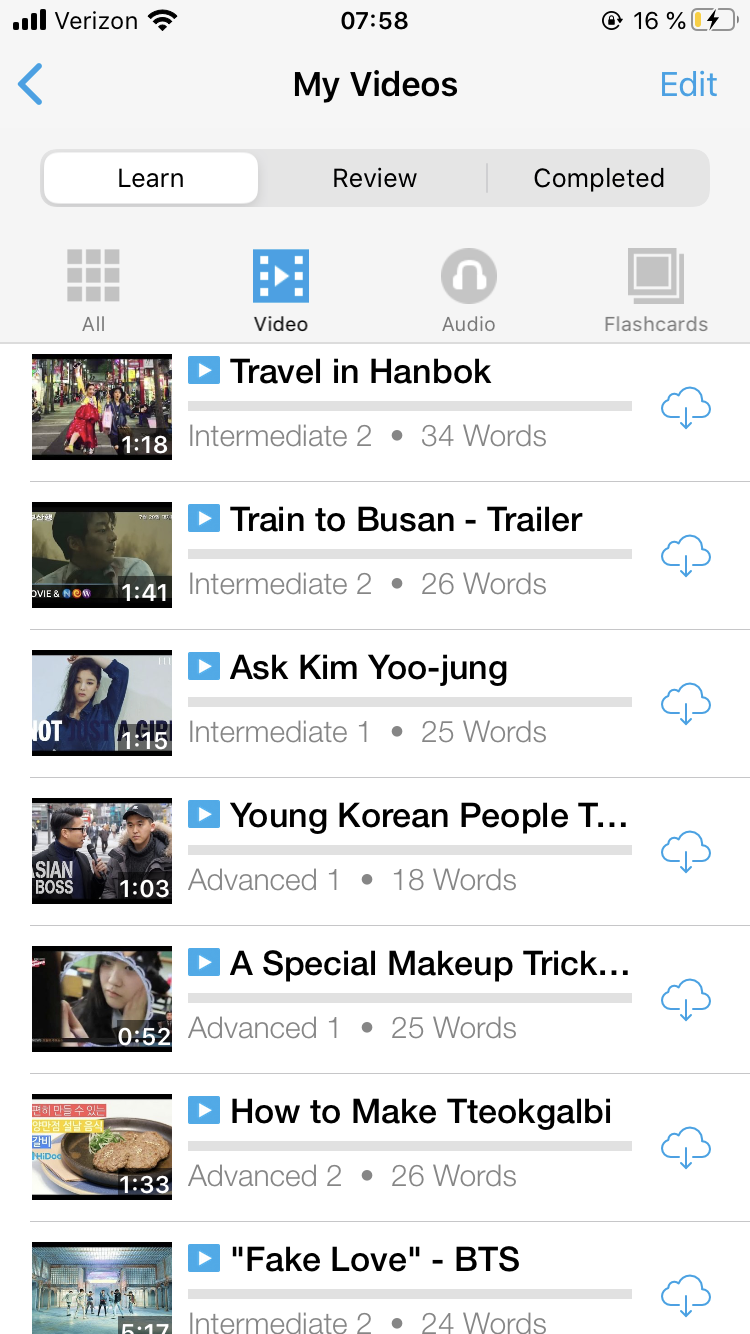
FluentU really takes the grunt work out of learning languages, leaving you with nothing but engaging, effective and efficient learning. It's already hand-picked the best videos for you (which are organized by level and topic), so all you have to do is simply choose any video that strikes your fancy to get started.
Each word in the interactive captions comes with a definition, audio, image, example sentences and more.
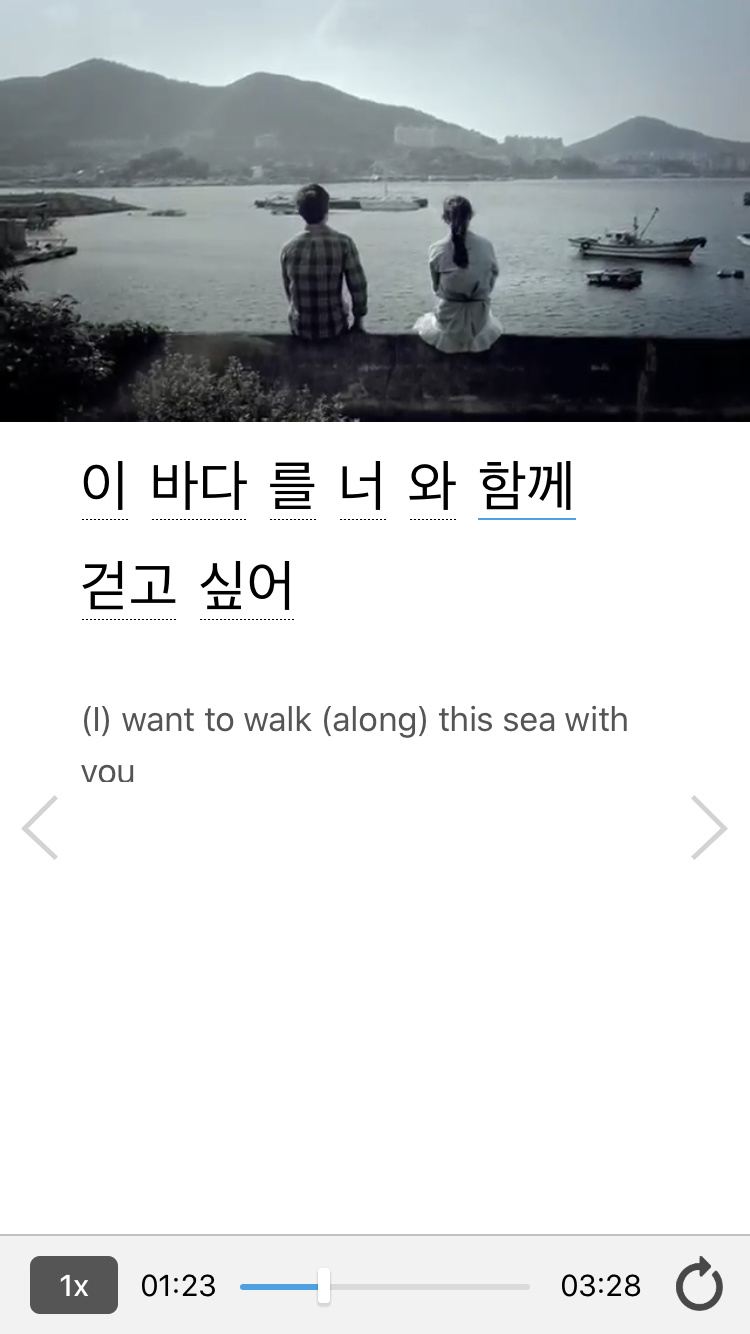
Access a complete interactive transcript of every video under the Dialogue tab, and easily review words and phrases from the video under Vocab.

You can use FluentU’s unique Quiz Mode to learn the vocabulary and phrases from the video through fun questions.
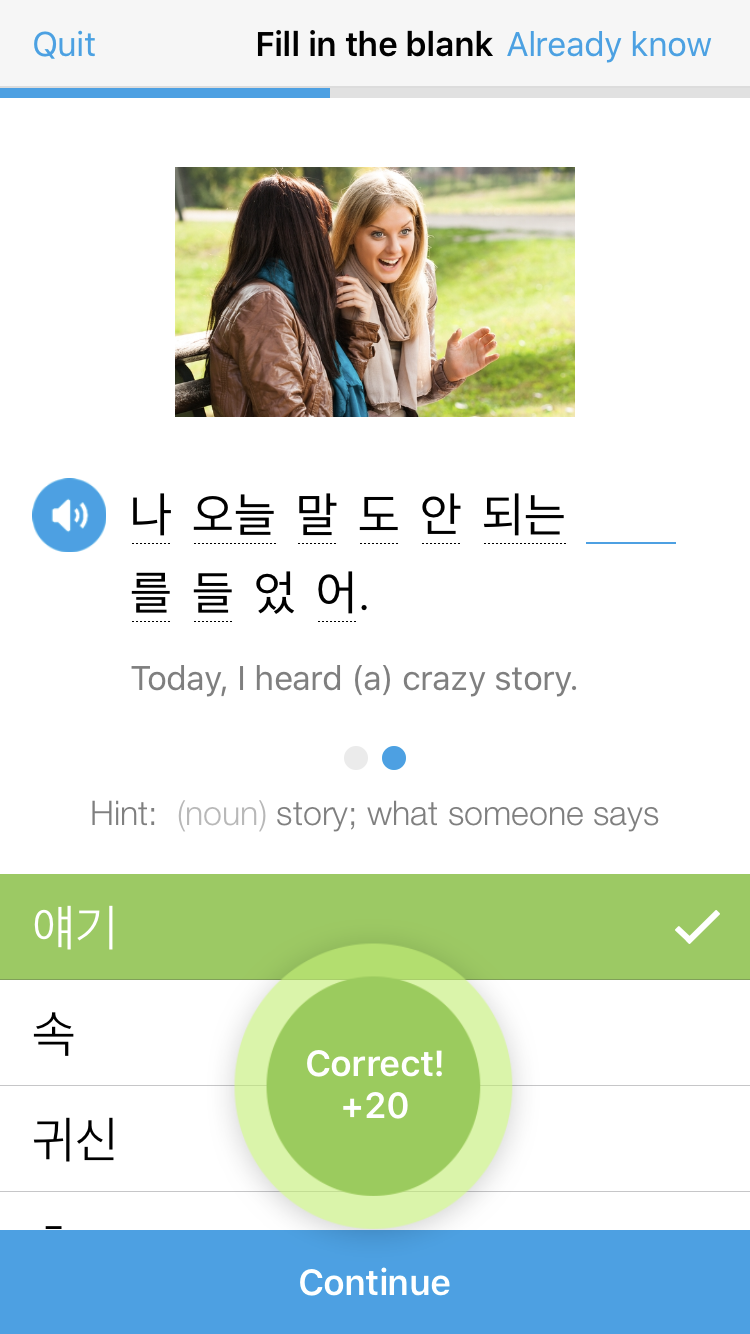
FluentU keeps track of what you're learning, and tells you exactly when it's time for review, giving you a 100% personalized experience.
Review sessions use video context to help embed the words in your memory.
The best part? You can try FluentU for free with a trial.
If you liked this post, something tells me that you'll love FluentU, the best way to learn Korean with real-world videos.
Experience Korean immersion online!

-
-